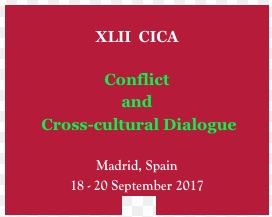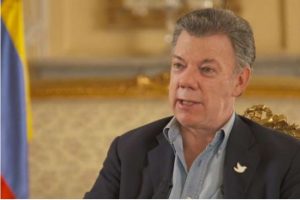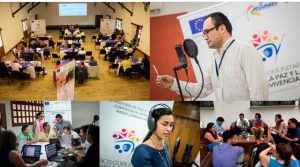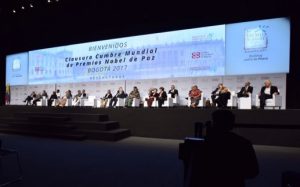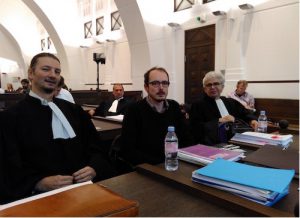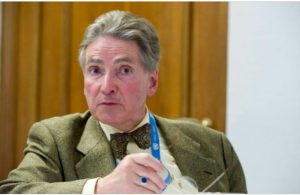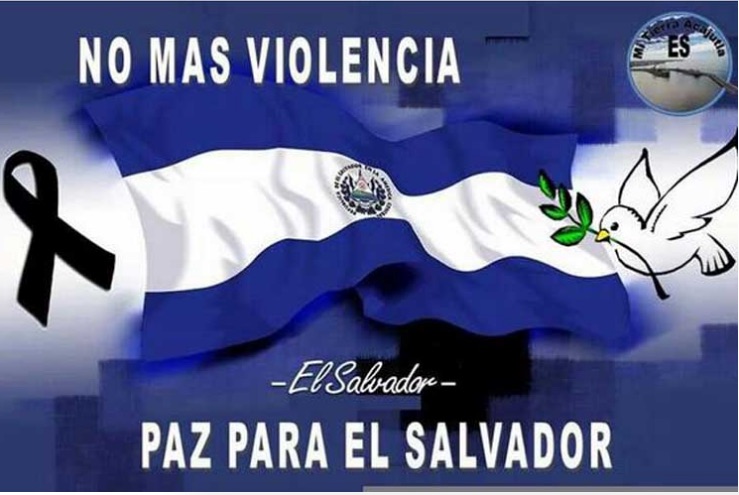FREE FLOW OF INFORMATION
A survey by CPNN
April 22, recognized as Día Internacional de la Madre Tierra (Mother Earth Day) by the United Nations, was celebrated throughout Latin America and the Caribbean. Some of this year’s celebrations underline the link between care for the earth and the need for peace and disarmament.

The World Embassy of Peace Activists celebrated International Mother Earth Day in the Torreón Urban Forest. The event sought to promote the protection of ecological balance and raise awareness among citizens about the deterioration of the planet by the “uncontrolled” use of nature and its impact on the safety and health of human beings. The embassy presented the Proclamation of Constitution of the Rights of Mother Earth. The document considers that it is necessary to establish a solid basis for a sustainable and resilient development and growth, where the interrelation between the rights of Mother Earth and the fundamental rights of human beings is recognized.
President Evo Morales, through his Twitter expressed Saturday that as children of Mother Earth our duty is to defend it, in the framework of the International Day of Mother Earth. “We are all children of Mother Earth, we come and we end in her, therefore, as sisters and brothers, our duty is to take care of her.” He says he is convinced that the planet would exist better without the human being while the human being would not live without the planet. Pachamama or death! The president asks how much was spent on the preservation of MadreTierra in 2016, when the capitalist budget for arms purchases was US $ 68 billion?
As the world celebrated Earth Day yesterday, members of the National Council of Orisha Elders in T&T marked the occasion with a march through San Fernando praying for an end to violence. The procession began with prayers and offerings of olive oil, milk, water and honey to the earth by various priests in the Orisha faith at Kings Wharf, San Fernando, at 10 am yesterday. “It is done to elevate the female principle through our Mother of the Earth, through our Onile because of the crime situation in the country and the violence against women and children generally and to elevate the feeling of despair that permeates the land today.”
Chile commemorated International Earth Day with activities in different parts of the country including distribution of seeds in Santiago and a walk with astronomical observation in La Serena. “The activity intends that through a walk in contact with nature can observe the astronomical richness of the region, but also taking into account how light pollution has effects on climate change,” explained the representative of the Ministry of Environment of the Region Of Coquimbo, Eduardo Fuentealba.
A hundred people, led by scientists and students of the National University of Colombia (UN), joined Saturday in the “March for Science” initiative that was born in the USA. In response to the cuts in funding for scientific research proposed by President Donald Trump. At the local level, the demonstration aimed to show the state that science is indispensable for progress in the economic, social and environmental fields. “Colombia has suffered budget cuts and there have been multiple state policies that threaten and restrict the capacities of science, and therefore of all its findings,” said UN geology student and logistics coordinator Maria Trinidad Ceferino
(Survey continued in right column)
What has happened this year (2017) for Earth Day?
(Survey continued from left column)
Public and private environmental organizations in Honduras commemorated “Earth Day” with the planting of thousands of trees in urban and rural areas to raise awareness of the importance of caring for the planet. The crusade has also been joined by students from schools and colleges.
The Sandinista Youth organized a walk and fair on Saturday in Juigalpa, to celebrate Earth Day. The tour of the main streets of the city is called ““Amor a la Naturaleza, Corazón Verde” (“Love to Nature, Heart of Green”) and its objective is to sensitize people about the importance of preserving Mother Earth with responsible attitudes that help protect natural resources, as well as flora and fauna. The activity included a varied cultural program, with cultural presentations, folkloric dances, competitions, and recognitions to young people that stand out in the protection of the environment.
Panama joins the international community in the commemoration of Earth Day with festivals, waste collection, tree planting and messages about the permanent responsibility of all to preserve the planet.”
Joining the commemoration of World Earth Day, Saturday, April 22, various educational and recreational activities take place in the zonal clubs and metropolitan parks of the capital, reported the Municipality of Lima. These activities promote the care of green areas, trees and biodiversity of these ecosystems that extend over more than 400 hectares in Lima. In the zone clubs Flor de Amancaes (Villa Maria del Triunfo); Huáscar (Villa el Salvador); Huiracocha (San Juan de Lurigancho), among others, there are parades, educational talks, storytelling, play activities, recycling workshops and small plants will be given to visitors. One of the most symbolic activities is the placement of messages in the branches of trees, as a call to citizens to express our commitment to mother earth.
The president of the Bolivarian Republic of Venezuela, Nicolás Maduro, celebrated Earth Day through a message shared in his Facebook account where it was expressed that “ecosocialism is a concept that we have promoted from the Bolivarian Government, it is a hope to make a change real and meaningful “. In this reflection, he said that since 1970, World Earth Day has been celebrated, “in an attempt to raise awareness about the serious climatic problems that have been affecting the planet due to pollution, the indiscriminate use of natural resources and the lack of policies that preserve the environment. ”
Barbadians are being urged to “pick up after themselves” after more than 200 bags of garbage was removed from a 12-kilometre stretch of West Coast beach yesterday. The exhortation has come from Gayle Talma, the group operations director of the Elegant Group of Companies as it spearheaded a clean-up campaign as part of Earth Day.
Argentina joins the international community in the commemoration of Earth Day with workshops, ecological activities and even the country’s first “bio festival” of music, held in the city of Rosario.

